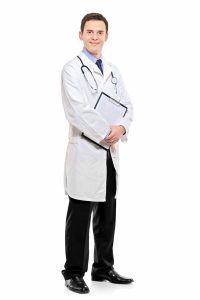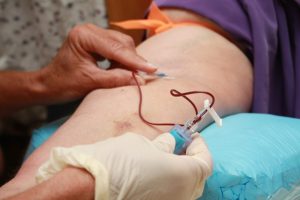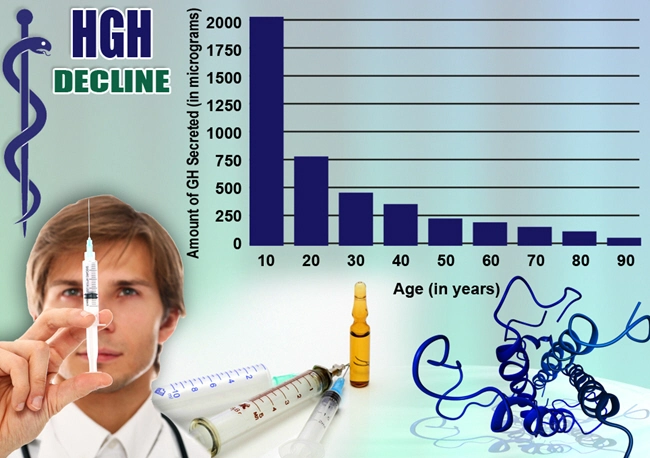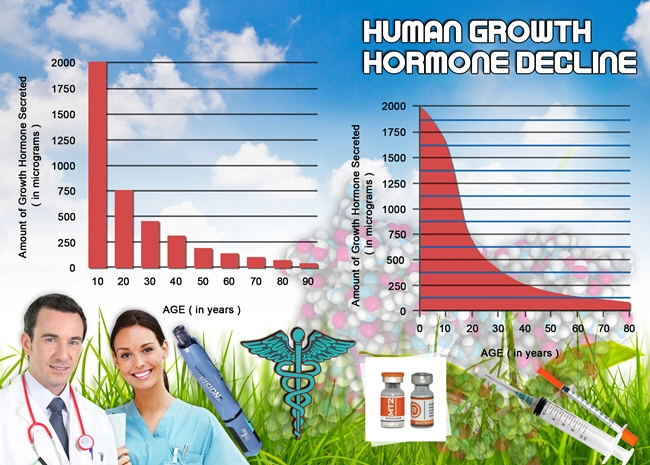
 Hormones are a factor in almost all of our body’s main functions, not just growth – though that’s the main one we think of, and is the main purpose of HGH (Human Growth Hormone). If your system doesn’t produce enough HGH, that can lead to serious health and quality-of-life problems, and growth hormone injections may be called for.
Hormones are a factor in almost all of our body’s main functions, not just growth – though that’s the main one we think of, and is the main purpose of HGH (Human Growth Hormone). If your system doesn’t produce enough HGH, that can lead to serious health and quality-of-life problems, and growth hormone injections may be called for.
Hormones are produced by several glands in our bodies, and the pituitary gland is considered to be the “master” gland, in control of the others. It’s also the one that produces HGH.
The pituitary gland is located within the brain, right below the hypothalamus, and it secretes its hormones after receiving chemical signals from the hypothalamus.
HGH production influences our height and our size, signals our bodies to build muscle and bone, and a lack of it leads to poor or incomplete development in children. Even though adults have less of it than children, a lack of it can cause many undesirable symptoms, as our bodies won’t be able to maintain their structures properly.
Some children are born with genetic defects leading to low HGH production, and some adults sustain damage to the pituitary gland which causes the same results – too-low HGH production, which then leads to poor health.
What to Expect from Human Growth Hormone Therapy
Are you a candidate for the health-restoring benefits of HGH supplementation? What kind of results can you expect? What exactly will the HGH do to your body? And are there potential negative effects?
First, one basic fact: HGH supplementation can definitely improve the lives of both children and adults who have a Human Growth Hormone deficiency.
Without sufficient HGH, children will not grow as they should. And, for everyone including adults, insufficient HGH has negative impacts on muscle mass, on bone density, and even on mood.
HGH also has an effect on reproduction, sexual function, and basic metabolism.
One way that HGH produces these effects is by processing our dietary protein intake, and our fat intake, breaking down these substances from our food and turning them into energy that the body uses to build new tissue. New tissue is always needed, as all of our trillions of cells have a limited lifespan and many must be replaced every day.
HGH levels naturally vary, even within a single day. Physical activity – or lack of it – can play a big part in that.
Physical activity, especially vigorous exercise, makes HGH levels go up, as can sleep, stress, and low blood sugar. Even small changes can have noticeable effects.
 HGH Deficiency in Children
HGH Deficiency in Children
Too little HGH in children can lead to unnaturally short stature or even dwarfism. If the condition is allowed to continue for too long, these conditions are irreversible.
Children with insufficient HGH usually show no symptoms at birth, but the condition becomes evident as time passes and the child fails to grow at least two inches per year and appears progressively smaller than his or her peers of the same age as time passes.
Other symptoms of HGH deficiency in children include impaired hair growth, and unusually “chubby” appearance, and delayed puberty.
Sometimes the condition can be traced to genetic inheritance; in other cases the cause is not known.
In adults, low HGH levels are often caused by damage to the pituitary gland. In cases where the damage is permanent, lifetime HGH supplementation may be necessary for optimal health.
Pituitary Tumors Can Cause HGH Imbalance
Low HGH levels can also be caused by pituitary tumors, head injuries, radiation therapy, and severe infections including meningitis.
Sometime, even treatment for a pituitary tumor, such as radiotherapy or surgery, can cause damage to the gland itself, reducing or stopping the body’s HGH production.
Low HGH in adults can cause a large number of health problems, which can occur singly or in combination depending on the individual. Some of these conditions include: anxiety; depression, cognitive decline (brain fog); weak heart; weak bones; muscle weakness; excessive and continuous fatigue; increased stroke risk; increased fatty deposits in the trunk or waist area.
Low HGH levels can also trigger deficiencies of other important hormones, leading to a domino effect of serious health impacts.
 How to Effectively Treat Adult-Onset Growth Hormone Deficiency
How to Effectively Treat Adult-Onset Growth Hormone Deficiency
Patients suffering from certain diseases have been shown to improve after HGH treatments: 1) chronic kidney disease; 2) Prader-Willi syndrome (a genetic disease resulting in feeding problems, weak muscles, insufficient growth, delayed childhood development; 3) Noonan’s syndrome (a genetic disorder interfering with bodily development); 4) Turner’s Syndrome (in which women fail to fully develop their female characteristics).
HGH injections are a common way to increase HGH levels. This can be done in a clinic, or, after proper instructions from one’s doctor, can even be done at home by the patient himself.
Only a doctor can determine how much HGH should be injected, as every patient’s deficiency and condition is unique. Injections can occur daily or several times a week. Getting too much can be devastating, so patients should always follow the plan developed by their physicians after testing, examinations, and re-testing.
In some cases, the treatments will go on for years – it all depends on your particular condition, the degree of deficiency, and how your body responds to the treatment. Patients should carefully follow all instructions, and see him or her every month or so to assess progress and adjust the dosage if necessary.
A Blood Test is Necessary to Determine Candidacy for Treatment and Dosage
Blood tests will be given, a decision made to increase or decrease the amount of HGH supplied as a supplement. For some patients, the body recovers fully and treatments are discontinued. As part of the examinations, blood sugar levels, bone density, and cholesterol levels will also be checked to insure they are in a healthy range. (HGH injections can affect insulin response, and too little HGH can give rise to overly brittle bones and high cholesterol. Your doctor needs to fine-tune the dosage to your body and your specific condition. Just reading about what someone else did on the Internet and duplicating it could be very harmful to your health!)
Your doctor will consider many factors when deciding on or adjusting your dose, like age; patient symptoms and self-evaluation; extent of harm or deficiency based on measurements; your overall health; your body’s tolerance of the supplement (very important!); and ongoing blood test results.
In the case of children, the earlier the diagnosis and treatment occurs, the more likely it is that they will grow up to normal adult height and be indistinguishable from others when they become adults.
 In some cases, children undergoing HGH supplementation have experienced dramatic and satisfactory growth after just a few years of treatment.
In some cases, children undergoing HGH supplementation have experienced dramatic and satisfactory growth after just a few years of treatment.
For some adults, HGH supplementation has to continue for a lifetime.
Many adults have to take HGH treatment for the remainder of their life.
The goal of the injections is to restore proper levels of energy, proper development, reduce excessive body fat (especially belly fat), secure a healthy metabolism, improve toleration of exercise or other exertion, improve muscle strength, and improve sexual function for those who are low in HGH.
The goal of growth hormone treatments in adults and children is to restore energy, metabolism, and enhance body development or shape. It can help to reduce total body fat, especially around the belly.
It’s often successful in those goals, with most patients happy and enthusiastic about their improved quality of life.
Contact Us Today For A Free Consultation
Dear Patient,
Once you have completing the above contact form, for security purposes and confirmation, please confirm your information by calling us.
Please call now: 1-800-380-5339.
Welcoming You To Our Clinic, Professor Tom Henderson.

- Our HGH Clinic And Web Site Privacy Policy [Last Updated On: May 23rd, 2019] [Originally Added On: December 14th, 2017]
- Idaho HGH Clinics [Last Updated On: August 26th, 2025] [Originally Added On: March 19th, 2018]
- Injectable HGH Prescriptions In Cheyenne, Wyoming [Last Updated On: April 15th, 2025] [Originally Added On: March 3rd, 2019]
- Injectable HGH Prescriptions In Milwaukee, Wisconsin [Last Updated On: April 19th, 2025] [Originally Added On: March 3rd, 2019]
- Injectable HGH Prescriptions In Madison, Wisconsin [Last Updated On: April 1st, 2025] [Originally Added On: March 3rd, 2019]
- Injectable HGH Prescriptions In Green Bay, Wisconsin [Last Updated On: March 22nd, 2025] [Originally Added On: March 3rd, 2019]
- Injectable HGH Prescriptions In Charleston, West Virginia [Last Updated On: May 17th, 2025] [Originally Added On: March 3rd, 2019]
- Injectable HGH Prescriptions In Vancouver, Washington [Last Updated On: February 18th, 2025] [Originally Added On: March 3rd, 2019]
- Injectable HGH Prescriptions In Tacoma, Washington [Last Updated On: January 16th, 2025] [Originally Added On: March 3rd, 2019]
- Injectable HGH Prescriptions In Spokane, Washington [Last Updated On: April 16th, 2025] [Originally Added On: March 3rd, 2019]
- Injectable HGH Prescriptions In Seattle, Washington [Last Updated On: May 30th, 2025] [Originally Added On: March 3rd, 2019]
- Injectable HGH Prescriptions In Washington D.C [Last Updated On: January 15th, 2025] [Originally Added On: March 3rd, 2019]
- Injectable HGH Prescriptions In Bellevue, Washington [Last Updated On: June 1st, 2025] [Originally Added On: March 3rd, 2019]
- Injectable HGH Prescriptions In Virginia Beach, Virginia [Last Updated On: January 18th, 2025] [Originally Added On: March 3rd, 2019]
- Injectable HGH Prescriptions In Richmond, Virginia [Last Updated On: January 25th, 2025] [Originally Added On: March 3rd, 2019]
- Injectable HGH Prescriptions In Portsmouth, Virginia [Last Updated On: April 10th, 2025] [Originally Added On: March 3rd, 2019]
- Injectable HGH Prescriptions In Norfolk, Virginia [Last Updated On: May 28th, 2025] [Originally Added On: March 3rd, 2019]
- Injectable HGH Prescriptions In Newport News, Virginia [Last Updated On: April 12th, 2025] [Originally Added On: March 3rd, 2019]
- Injectable HGH Prescriptions In Hampton, Virginia [Last Updated On: January 11th, 2025] [Originally Added On: March 3rd, 2019]
- Injectable HGH Prescriptions In Chesapeake, Virginia [Last Updated On: January 9th, 2025] [Originally Added On: March 3rd, 2019]
- Injectable HGH Prescriptions In Arlington, Virginia [Last Updated On: February 6th, 2025] [Originally Added On: March 3rd, 2019]
- Injectable HGH Prescriptions In Alexandria, Virginia [Last Updated On: May 24th, 2025] [Originally Added On: March 3rd, 2019]
- Injectable HGH Prescriptions In Montpelier, Vermont [Last Updated On: April 29th, 2025] [Originally Added On: March 3rd, 2019]
- Injectable HGH Prescriptions In West Valley City, Utah [Last Updated On: April 16th, 2025] [Originally Added On: March 3rd, 2019]
- Injectable HGH Prescriptions In West Jordan, Utah [Last Updated On: March 15th, 2025] [Originally Added On: March 3rd, 2019]
- Injectable HGH Prescriptions In Salt Lake City, Utah [Last Updated On: January 28th, 2025] [Originally Added On: March 3rd, 2019]
- Injectable HGH Prescriptions In Provo, Utah [Last Updated On: May 12th, 2025] [Originally Added On: March 3rd, 2019]
- Injectable HGH Prescriptions In Wichita Falls, Texas [Last Updated On: April 1st, 2025] [Originally Added On: March 3rd, 2019]
- Injectable HGH Prescriptions In Waco, Texas [Last Updated On: March 15th, 2025] [Originally Added On: March 3rd, 2019]
- Injectable HGH Prescriptions In San Antonio, Texas [Last Updated On: February 4th, 2025] [Originally Added On: March 3rd, 2019]
- Injectable HGH Prescriptions In Round Rock, Texas [Last Updated On: December 29th, 2024] [Originally Added On: March 3rd, 2019]
- Injectable HGH Prescriptions In Richardson, Texas [Last Updated On: March 10th, 2025] [Originally Added On: March 3rd, 2019]
- Injectable HGH Prescriptions In Plano, Texas [Last Updated On: February 6th, 2025] [Originally Added On: March 3rd, 2019]
- Injectable HGH Prescriptions In Pasadena, Texas [Last Updated On: March 31st, 2025] [Originally Added On: March 3rd, 2019]
- Injectable HGH Prescriptions In Midland, Texas [Last Updated On: April 23rd, 2025] [Originally Added On: March 3rd, 2019]
- Injectable HGH Prescriptions In Mesquite, Texas [Last Updated On: April 9th, 2025] [Originally Added On: March 3rd, 2019]
- Injectable HGH Prescriptions In McKinney, Texas [Last Updated On: May 19th, 2025] [Originally Added On: March 3rd, 2019]
- Injectable HGH Prescriptions In McAllen, Texas [Last Updated On: April 3rd, 2025] [Originally Added On: March 3rd, 2019]
- Injectable HGH Prescriptions In Lubbock, Texas [Last Updated On: May 10th, 2025] [Originally Added On: March 3rd, 2019]
- Injectable HGH Prescriptions In Lewisville, Texas [Last Updated On: January 29th, 2025] [Originally Added On: March 3rd, 2019]
- Injectable HGH Prescriptions In Laredo, Texas [Last Updated On: April 26th, 2025] [Originally Added On: March 3rd, 2019]
- Injectable HGH Prescriptions In Killeen, Texas [Last Updated On: March 4th, 2025] [Originally Added On: March 3rd, 2019]
- Injectable HGH Prescriptions In Irving, Texas [Last Updated On: February 9th, 2025] [Originally Added On: March 3rd, 2019]
- Injectable HGH Prescriptions In Houston, Texas [Last Updated On: April 6th, 2025] [Originally Added On: March 3rd, 2019]
- Injectable HGH Prescriptions In Grand Prairie, Texas [Last Updated On: January 17th, 2025] [Originally Added On: March 3rd, 2019]
- Injectable HGH Prescriptions In Garland, Texas [Last Updated On: February 14th, 2025] [Originally Added On: March 3rd, 2019]
- Injectable HGH Prescriptions In Fort Worth, Texas [Last Updated On: April 21st, 2025] [Originally Added On: March 3rd, 2019]
- Injectable HGH Prescriptions In El Paso, Texas [Last Updated On: February 28th, 2025] [Originally Added On: March 3rd, 2019]
- Injectable HGH Prescriptions In Denton, Texas [Last Updated On: May 6th, 2025] [Originally Added On: March 3rd, 2019]
- Injectable HGH Prescriptions In Dallas, Texas [Last Updated On: December 31st, 2024] [Originally Added On: March 3rd, 2019]
- Injectable HGH Prescriptions In Corpus Christi, Texas [Last Updated On: June 7th, 2025] [Originally Added On: March 3rd, 2019]
- Injectable HGH Prescriptions In Carrollton, Texas [Last Updated On: June 3rd, 2025] [Originally Added On: March 3rd, 2019]
- Injectable HGH Prescriptions In Brownsville, Texas [Last Updated On: February 4th, 2025] [Originally Added On: March 3rd, 2019]
- Injectable HGH Prescriptions In Beaumont, Texas [Last Updated On: April 4th, 2025] [Originally Added On: March 3rd, 2019]
- Injectable HGH Prescriptions In Austin, Texas [Last Updated On: June 5th, 2025] [Originally Added On: March 3rd, 2019]
- Injectable HGH Prescriptions In Arlington, Texas [Last Updated On: January 13th, 2025] [Originally Added On: March 3rd, 2019]
- Injectable HGH Prescriptions In Amarillo, Texas [Last Updated On: March 18th, 2025] [Originally Added On: March 3rd, 2019]
- Injectable HGH Prescriptions In Abilene, Texas [Last Updated On: January 5th, 2025] [Originally Added On: March 3rd, 2019]
- Injectable HGH Prescriptions In Nashville, Tennessee [Last Updated On: March 2nd, 2025] [Originally Added On: March 3rd, 2019]
- Injectable HGH Prescriptions In Murfreesboro, Tennessee [Last Updated On: March 8th, 2025] [Originally Added On: March 3rd, 2019]
- Injectable HGH Prescriptions In Memphis, Tennessee [Last Updated On: March 28th, 2025] [Originally Added On: March 3rd, 2019]
- Injectable HGH Prescriptions In Knoxville, Tennessee [Last Updated On: March 25th, 2025] [Originally Added On: March 3rd, 2019]
- Injectable HGH Prescriptions In Clarksville, Tennessee [Last Updated On: February 2nd, 2025] [Originally Added On: March 3rd, 2019]
- Injectable HGH Prescriptions In Chattanooga, Tennessee [Last Updated On: January 29th, 2025] [Originally Added On: March 3rd, 2019]
- Injectable HGH Prescriptions In Sioux Falls, South Dakota [Last Updated On: December 25th, 2024] [Originally Added On: March 3rd, 2019]
- Injectable HGH Prescriptions In Columbia, South Carolina [Last Updated On: February 2nd, 2025] [Originally Added On: March 3rd, 2019]
- Injectable HGH Prescriptions In Charleston, South Carolina [Last Updated On: January 31st, 2025] [Originally Added On: March 3rd, 2019]
- Injectable HGH Prescriptions In Providence, Rhode Island [Last Updated On: January 30th, 2025] [Originally Added On: March 3rd, 2019]
- Injectable HGH Prescriptions In Pittsburgh, Pennsylvania [Last Updated On: May 18th, 2025] [Originally Added On: March 3rd, 2019]
- Injectable HGH Prescriptions In Erie, Pennsylvania [Last Updated On: January 4th, 2025] [Originally Added On: March 3rd, 2019]
- Injectable HGH Prescriptions In Allentown, Pennsylvania [Last Updated On: May 6th, 2025] [Originally Added On: March 3rd, 2019]
- Injectable HGH Prescriptions In Salem, Oregon [Last Updated On: January 31st, 2025] [Originally Added On: March 3rd, 2019]
- Injectable HGH Prescriptions In Portland, Oregon [Last Updated On: February 1st, 2025] [Originally Added On: March 3rd, 2019]
- Injectable HGH Prescriptions In Gresham, Oregon [Last Updated On: January 30th, 2025] [Originally Added On: March 3rd, 2019]
- Injectable HGH Prescriptions In Eugene, Oregon [Last Updated On: January 27th, 2025] [Originally Added On: March 3rd, 2019]
- Injectable HGH Prescriptions In Tulsa, Oklahoma [Last Updated On: May 26th, 2025] [Originally Added On: March 3rd, 2019]
- Injectable HGH Prescriptions In Oklahoma City, Oklahoma [Last Updated On: February 22nd, 2025] [Originally Added On: March 3rd, 2019]
- Injectable HGH Prescriptions In Norman, Oklahoma [Last Updated On: April 28th, 2025] [Originally Added On: March 3rd, 2019]
- Injectable HGH Prescriptions In Toledo, Ohio [Last Updated On: April 14th, 2025] [Originally Added On: March 3rd, 2019]
- Injectable HGH Prescriptions In Dayton, Ohio [Last Updated On: April 11th, 2025] [Originally Added On: March 3rd, 2019]








